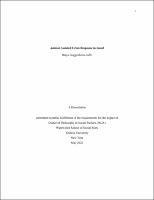Please use this identifier to cite or link to this item:
https://hdl.handle.net/20.500.12202/8310| Title: | Animal-Assisted Crisis Response in Israel |
| Authors: | Mason, Susan Glassman, Urania Lane, Shannon Rosenberg, Joan Jaffe, Batya G. |
| Keywords: | social work Animal-assisted crisis response Animal-assisted interventions Crisis response PFA Trauma Trauma survivors |
| Issue Date: | May-2022 |
| Publisher: | Yeshiva University |
| Citation: | Jaffe, B. G. (2022, M.) Animal-Assisted Crisis Response in Israel (Publication No. 29258739) [Doctoral dissertation, Yeshiva University]. ProQuest Dissertations & Theses Global. |
| Series/Report no.: | Wurzweiler School of Social Work: Dissertations;Publication No. 29258739 |
| Abstract: | Animals have been utilized in mental health settings to improve patient outcomes since the 18th century (Serpell, 2006). Trauma research has demonstrated that untreated trauma can result in higher vulnerability to stress and additional trauma exposures (MacFarlane, 2010). The closer the intervention is to the occurrence of trauma, the greater likelihood of preventing PTSD in both frequency and intensity (Rothbaum, Kearns, Price, Malcoun, Davis, Ressler, Lang & Houry, 2012). Research in animal companionship has shown reduction in physiological stress responses (Friedman, Katcher, Thomas, Lynch & Messent, 1983). Mental stabilization of trauma victims at the scene of traumatic incidents is often a difficult task to achieve. Animal-Assisted Crisis Response (AACR) is a beneficial intervention utilized at trauma scenes to achieve mental stabilization and prevent further complications such as Post-Trauma-Syndrome. AACR appears to augment standard interventions for trauma. The main research question of this study was: “How does AACR affect people present at a trauma scene?” The secondary question was, “How does AACR compare to other models of crisis response?” Twenty-one participants were interviewed about their experiences as crisis responders and AACR. Findings revealed the benefits this intervention provides trauma survivors, bystanders, and first responders at trauma scenes. Furthermore, it illuminated deeper nuances of the meaning of AACR for responders and survivors; as well as the benefits and challenges of its implementation. Finally, a deep desire for the growth of AACR in the trauma field is demonstrated. Future research should concentrate on providing more evidence-based research and a protocol for AACR in Israel. |
| Description: | Doctoral dissertation, PhD / Open Access |
| URI: | https://hdl.handle.net/20.500.12202/8310 https://ezproxy.yu.edu/login?url=https://www.proquest.com/dissertations-theses/animal-assisted-crisis-response-israel/docview/2697677785/se-2?accountid=15178 |
| ISBN: | 9798837504327 |
| Appears in Collections: | Wurzweiler School of Social Work: Dissertations |
Files in This Item:
| File | Description | Size | Format | |
|---|---|---|---|---|
| Batya Jaffee OA May2022 Dissertation Final O.pdf | 665.58 kB | Adobe PDF |  View/Open |
This item is licensed under a Creative Commons License

